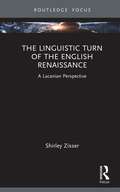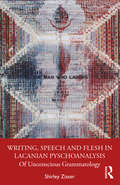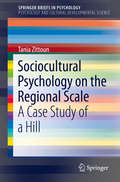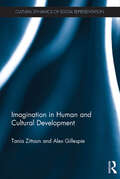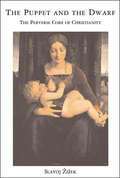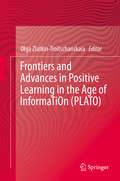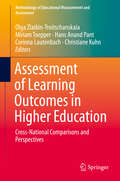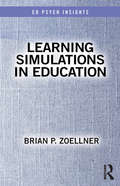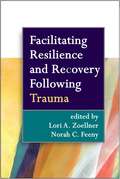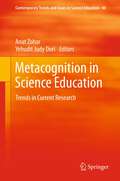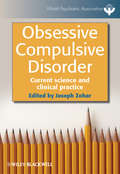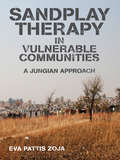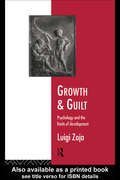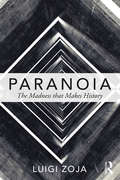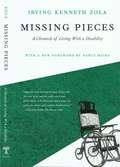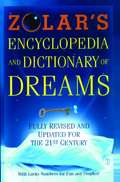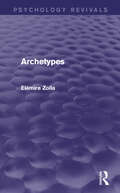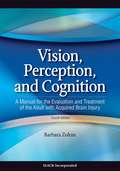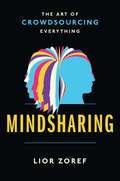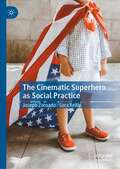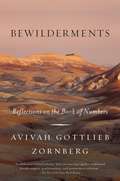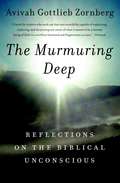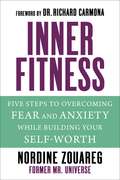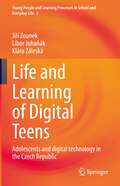- Table View
- List View
The Linguistic Turn of the English Renaissance: A Lacanian Perspective (Routledge Focus on Mental Health)
by Shirley ZisserThe Linguistic Turn of the English Renaissance: A Lacanian Perspective examines a selection of cultural phenomena of the English Renaissance, all of which include a focus on language, from a Lacanian perspective. The book examines four inter-related cultural symptoms of the English Renaissance: the paucity of painting, the interest in rhetoric, the emergence of a literary style focusing on form and a fascination with the myth of Orpheus. The book argues that the English Renaissance, an apex of rhetorical theory, can offer psychoanalysis further knowledge concerning the intrication of language and flesh, especially where feminine jouissance is at stake. These language-centred phenomena emerge against the backdrop of a peculiar configuration of the visual field, which in contrast to other cultures of the European Renaissance is largely barren of painting other than portraiture. The book will be of interest to psychoanalysts, scholars of Renaissance culture and those interested in the psychoanalytic study of culture.
Writing, Speech and Flesh in Lacanian Psychoanalysis: Of Unconscious Grammatology
by Shirley ZisserThis book explores the place of the flesh in the linguistically-inflected categories of Freudian and Lacanian psychoanalysis, drawing explicit attention to the organic as an inherent part of the linguistic categories that appear in the writings of Freud and Lacan. Lacan’s ‘return to Freud’ famously involves a ‘linguistic turn’ in psychoanalysis. The centering of language as a major operator in psychic life often leads to a dualistic or quasi-dualistic view in which language and the enjoyment of the body are polarized. Exploring the intricate connections of the linguistic and the organic in both Lacanian and Freudian psychoanalysis from its beginnings, Zisser shows that surprisingly, and not only in Lacan’s late teaching, psycho-linguistic categories turn out to be suffused with organicity. After unfolding the remnant of the flesh in the signifier as a major component of Lacan’s critique of Saussure, using visual artworks as objective correlatives as it does so, the book delineates two forms of psychic writing. These are aligned not only with two fundamental states of the psychic apparatus as described by Freud (pain and satisfaction), but with two ways of sculpting formulated by Alberti in the Renaissance but also referred to by Freud. Continuing in a Derridean vein, the book demonstrates the primacy of writing to speech in psychoanalysis, emphasizing how the relation between speech and writing is not binary but topological, as speech in its psychoanalytic conception is nothing but the folding inside-out of unconscious writing. Innovatively placing the flesh at the core of its approach, the text also incorporates the seminal work of psychoanalyst Michèle Montrelay to articulate the precise relation between the linguistic and the organic. Writing, Speech and Flesh in Lacanian Psychoanalysis will be indispensable to psychoanalysts, literary theorists, rhetoricians, deconstructionists, and those studying at the intersection of psychoanalysis, language, and the visual arts.
Sociocultural Psychology on the Regional Scale: A Case Study of a Hill (SpringerBriefs in Psychology)
by Tania ZittounThis brief presents the case study of a hill in Czech Republic (Říp) and its region, and contributes to theorization in sociocultural psychology on three points, along three current debates. First, it contributes to the exploration of the mutual constitution of the lifecourse and of history, uses a distinction between socio-, micro- and ontogenesis, and argues that a focus on a delimited geographical space enables to better observe the processes by which history, daily situated interactions and courses of life shape each other. Second, in doing so, it sketches an understanding of the role of the material, spatial and semiotic specificities of landscapes in human development. Especially, it identifies some of the processes by which redundant dynamic patterns present in the environment may participate to the guidance of human experience. Third, it expands the reflection on case study construction and generalization. On the one side, it participates to a current debate in cultural psychology on the dynamics of generalization from single cases; on the other, it also dialogues with a more general reflection in the social sciences on social dynamics at the scale of small regions. Altogether, this brief is a first attempt to examine jointly these questions at the scale of a small region, a unique natural laboratory of social and psychological change. It will be of interest to researchers as well as graduate students in the fields of cultural and sociocultural psychology, cognitive psychology, and the social sciences.
Imagination in Human and Cultural Development (Cultural Dynamics of Social Representation)
by Tania Zittoun Alex GillespieThis book positions imagination as a central concept which increases the understanding of daily life, personal life choices, and the way in which culture and society changes. Case studies from micro instances of reverie and daydreaming, to utopian projects, are included and analysed. The theoretical focus is on imagination as a force free from immediate constraints, forming the basis of our individual and collective agency. In each chapter, the authors review and integrate a wide range of classic and contemporary literature culminating in the proposal of a sociocultural model of imagination. The book takes into account the triggers of imagination, the content of imagination, and the outcomes of imagination. At the heart of the model is the interplay between the individual and culture; an exploration of how the imagination, as something very personal and subjective, grows out of our shared culture, and how our shared culture can be transformed by acts of imagination. Imagination in Human and Cultural Development offers new perspectives on the study of psychological learning, change, innovation and creativity throughout the lifespan. The book will appeal to academics and scholars in the fields of psychology and the social sciences, especially those with an interest in development, social change, cultural psychology, imagination and creativity.
The Puppet and the Dwarf: The Perverse Core of Christianity (Short Circuits)
by Slavoj ZizekOne of our most daring intellectuals offers a Lacanian interpretation of religion, finding that early Christianity was the first revolutionary collective. Slavoj Žižek has been called "an academic rock star" and "the wild man of theory"; his writing mixes astonishing erudition and references to pop culture in order to dissect current intellectual pieties. In The Puppet and the Dwarf he offers a close reading of today's religious constellation from the viewpoint of Lacanian psychoanalysis. He critically confronts both predominant versions of today's spirituality—New Age gnosticism and deconstructionist-Levinasian Judaism—and then tries to redeem the "materialist" kernel of Christianity. His reading of Christianity is explicitly political, discerning in the Pauline community of believers the first version of a revolutionary collective. Since today even advocates of Enlightenment like Jurgen Habermas acknowledge that a religious vision is needed to ground our ethical and political stance in a "postsecular" age, this book—with a stance that is clearly materialist and at the same time indebted to the core of the Christian legacy—is certain to stir controversy.
Frontiers and Advances in Positive Learning in the Age of InformaTiOn (PLATO)
by Olga Zlatkin-TroitschanskaiaResearch on students’ media use outside of education is just slowly taking off. Influences of information and communication technologies (ICT) on human information processing are widely assumed and particularly effects of dis- and misinformation are a current threat to democracies. Today, higher education competes with a very diverse (online) media landscape and domain-specific content from sources of varying quality, ranging from high-quality videographed lectures by top-level university lecturers, popular-scientific video talks, collaborative wikis, anonymous forum comments or blog posts to YouTube remixes of discipline factoids and unverified twitter feeds. Self-organizing learners need more knowledge, skills, and awareness on how to critically evaluate quality and select trustworthy sources, how to process information, and what cognitive, affective, attitudinal, behavioral, and neurological effects it can have on them in the long term. The PLATO program takes on the ambitious goal of uniting strands of research from various disciplines to address these questions through fundamental analyses of human information processing when learning with the Internet. This innovative interdisciplinary approach includes elements of ICT innovations and risks, learning analytics and large-scale computational modelling aimed to provide us with a better understanding of how to effectively and autonomously acquire reliable knowledge in the Information Age, how to design ICTs, and shape social and human-machine interactions for successful learning. This volume will be of interest to researchers in the fields of educational sciences, educational measurement and applied branches of the involved disciplines, including linguistics, mathematics, media studies, sociology of knowledge, philosophy of mind, business, ethics, and educational technology.
Assessment of Learning Outcomes in Higher Education: Cross-national Comparisons And Perspectives (Methodology of Educational Measurement and Assessment)
by Olga Zlatkin-Troitschanskaia Miriam Toepper Hans Anand Pant Corinna Lautenbach Christiane KuhnThis book offers a comprehensive overview of current, innovative approaches to assessing generic and domain-specific learning outcomes in higher education at both national and international levels. It discusses the most significant initiatives over the past decade to develop objective, valid, and reliable assessment tools and presents state-of-the-art procedures to adapt and validate them for use in other countries. The authors highlight key conceptual and methodological challenges connected with intra-national and cross-national assessment of learning outcomes in higher education; introduce novel approaches to improving assessment, evaluation, testing, and measurement practices; and offer exemplary implementation frameworks. Further, they examine the results of and lessons learned from various recent, world-renowned research programs and feasibility studies, and present results from their own studies to provide new insights into how to draw valid conclusions about learning outcomes achieved in various contexts.
Learning Simulations in Education (Ed Psych Insights)
by Brian P. ZoellnerTechnology-enabled simulations are increasingly used for students in K-12 education and have the potential to improve teaching and learning across domains. Across five chapters, this book explores the psychological foundation of simulation use in instruction, guiding readers through individual differences among learners and contexts while addressing theory, pedagogy, cognitive processes, and more. This concise volume is designed for any education course that includes simulations in the curriculum and will be indispensable for student researchers and both pre- and in-service teachers alike.
Facilitating Resilience and Recovery Following Trauma
by Lori A. Zoellner Norah C. FeenyThis volume synthesizes cutting-edge research on natural processes of resilience and recovery, highlighting implications for trauma treatment and prevention. Prominent experts examine what enables many trauma survivors to heal over time without intervention, as well what causes others to develop long-term psychiatric problems. Identifying key, modifiable risk and resilience factors--such as cognitions and beliefs, avoidance, pain, and social support--the book provides recommendations for when (and when not) to intervene to promote recovery. Illustrative case examples are included. A section on specific populations discusses children, military personnel, and low socioeconomic status or marginalized communities.
Metacognition in Science Education
by Anat Zohar Yehudit Judy DoriWhy is metacognition gaining recognition, both in education generally and in science learning in particular? What does metacognition contribute to the theory and practice of science learning? Metacognition in Science Education discusses emerging topics at the intersection of metacognition with the teaching and learning of science concepts, and with higher order thinking more generally. The book provides readers with a background on metacognition and analyses the latest developments in the field. It also gives an account of best-practice methodology. Expanding on the theoretical underpinnings of metacognition, and written by world leaders in metacognitive research, the chapters present cutting-edge studies on how various forms of metacognitive instruction enhance understanding and thinking in science classrooms. The editors strive for conceptual coherency in the various definitions of metacognition that appear in the book, and show that the study of metacognition is not an end in itself. Rather, it is integral to other important constructs, such as self-regulation, literacy, the teaching of thinking strategies, motivation, meta-strategies, conceptual understanding, reflection, and critical thinking. The book testifies to a growing recognition of the potential value of metacognition to science learning. It will motivate science educators in different educational contexts to incorporate this topic into their ongoing research and practice.
Obsessive Compulsive Disorder
by Joseph ZoharA clear summary of what is known about a highly prevalent and debilitating disorder that affects nearly as many people as does asthma. Expert authors review the biological basis for the disorder and describe both pharmacological and psychological approaches to treatment.
Sandplay Therapy in Vulnerable Communities: A Jungian Approach
by Eva Pattis ZojaSandplay Therapy in Vulnerable Communities offers a new method of therapeutic care for people in acute crisis situations such as natural disasters and war, as well as the long-term care of children and adults in areas of social adversity including slums, refugee camps and high-density urban areas. This book provides detailed case studies of work carried out in South Africa, China and Colombia and combines practical discussions of expressive sandwork projects with brief overviews of their sociohistoric background. Further topics covered include: the social aspect of psychoanalysis the importance of play pictographic writing and the psyche. Providing the reader with clear, practical instructions for carrying out their own sandwork project, this book will be essential reading not only for psychotherapists involved with sandplay therapy but also for those with an interest in cross cultural psychotherapy, as well as all professionals working with those in situations of social adversity.
Growth and Guilt: Psychology and the Limits of Development
by Luigi ZojaThe relentless exploitation of the earth's resources and technologys boundless growth are a matter of urgent concern. When did this race towards the limitless begin? The Greeks, who shaped the basis of Western thinking, lived in mortal fear of humanity's hidden hunger for the infinite and referred to it as hubris, the one true sin in their moral code. Whoever desired or possessed too much was implacably punished by nemesis, yet the Greeks themselves were to pioneer an unprecedented level of ambition that began to reverse that tabu. If it is true that no culture can truly repudiate its origins, and that gods who are no longer potent can vanish but still leave behind a body of myth which coninues to live and assert itself in modernized garb, then our concern with the limits of growth reflects something more than an awareness of new technological problems - it also brings to light a psychic wound a a feeling of guilt which are infinitely more ancient.
Paranoia: The madness that makes history
by Luigi ZojaLuigi Zoja presents an insightful analysis of the use and misuse of paranoia throughout history and in contemporary society. Zoja combines history with depth psychology, contemporary politics and tragic literature, resulting in a clear and balanced analysis presented with rare clarity. The devastating impact of paranoia on societies is explored in detail. Focusing on the contagious aspects of paranoia and its infectious, self-replicating dynamics, Zoja takes such diverse examples as Ajax and George W. Bush, Cain and the American Holocaust, Hitler, Stalin and Othello to illustrate his argument. He reconstructs the emblematic arguments that paranoia has promoted in Western history and examines how the power of the modern media and mass communication has affected how it spreads. Paranoia clearly examines how leaders lose control of their influence, how the collective unconscious acquires an autonomous life and how seductive its effects can be - more so than any political, religious or ideological discourse. This gripping study will be essential reading for depth and analytical psychologists, and academics and students of history, cultural studies, psychology, classical studies, literary studies, anthropology and sociology.
Missing Pieces: A Chronicle of Living With a Disability
by Irving Kenneth Zolahe personal odyssey of a man with a disability, this passionate book tries to tell as well as analyze what it is like to have a disability in a world that values vigor and health. Zola writes, "Missing Pieces is an unraveling of a social problem in the manner of Black Like Me. Like its author, I, too, am a trained social observer, but for me 'passing' was not an issue. For I already have the stigmata of the disable - the braces, the limp, the cane - though I have spent much of my life denying their existence." The author started out in the role of a social scientist on a seven-day excursion to acquaint himself with an extraordinary experiment in living - Het Dorp, one of the few places in the world designed to promote "the optimum happiness" of those with severe physical disabilities. Neither a medial center nor a nursing home, Het Dorp is a village in the western-most part of the Netherlands. What began as a sociological attempt to describe this unusual setting became, through the author's growing awareness, what can only be called a socio-autobiography. Resuming his prior dependence on a wheelchair, the author experienced his own transformation from someone who is "normal" and "valid" to someone who is "invalid." The routine of Het Dorp became his: he lived in an architecturally modified home, visited the workshops, and shared meals, social events, conversation, and perceptions with the remarkably diverse residents. The author confronts some rarely discussed issues - the self-image of a person with a chronic disability, how one fills one's time, how one deals with authority and dependence, and love and sex. Missing Pieces offers striking insights into an aspect of the human condition shared by nearly 30 million Americans. It is must reading for the general reader, as well as for the rehabilitation counselor, social worker, or social scientist. Author note: Irving Kenneth Zola (1935-1994) was Professor of Sociology at Brandeis University and a founding member and counselor at the Boston Self-Help Center. Nancy Mairs is the author of seven books, including Waist-High in the World: A Life Among the Disabled, and most recently, A Troubled Guest: Life and Death Stories. She lives in Tucson with her husband, George.
Zolar's Encyclopedia and Dictionary of Dreams
by ZolarThe completely revised and updated edition of the classic, best-selling guide to dream interpretation In the first major revision of the encyclopedia that has sold half a million copies worldwide, Zolar, the acclaimed "Dean of Astrology" (The New Yorker), has created the indispensable bedside reference for today's dreamers, reflecting the changes that have affected our waking hours and inevitably influence the content and significance of the messages we receive while we sleep. Looking at new cultural trends, work and social patterns, technologies and means of communication, Zolar reveals the meanings of dreams about cell phones, computers, cyberspace, beepers and much more. His concise and incisive explanations of such classic dreams as meeting a redheaded stranger, flying without wings and trying to comfort a crying baby are here as well, while obsolete subjects -- like girdles, gleaners and grenadiers -- have been eliminated. To complement each dream category a lucky number has been added for this new edition. With interpretations for more than 20,000 dreams, Zolar's Encyclopedia and Dictionary of Dreams offers you the opportunity to uncover the secrets hidden in your dreams and to act on the wisdom -- or respond to the warnings -- they contain.
Archetypes (Psychology Revivals)
by Elémire ZollaMan is dominated by his archetypes; they mould not only his history but his dreams. But how are we to define and evaluate them? Is it perhaps possible for us to relate more creatively to them? Originally published in 1981, these are some of the questions raised by this title. To answer them the author gathered together a vast amount of material drawn from Eastern and Western traditions, from science, literature, art and poetry. The answers he puts forward are often highly original and will surely challenge many of our most cherished patterns of thought. There emerges from this book what can only be described as a global metaphysical system, yet the author’s language is not that of an ordinary metaphysical treatise, and what he writes offered new challenge and hope to those suffering from the despair and cynicism engendered by a great deal in modern society at the time. Zolla does not, however, advocate a return to earlier historical patterns, nor is he proposing a new Utopia, but rather offers us a brilliant series of lessons in the art of centring. In the words of Bernard Wall, writing in the Times Literary Supplement, Zolla’s ‘deep, polymathic probing of the terms of human existence makes it sensible to compare him with Simone Weil, while some of his conclusions about ultimate mysteries – expressed in signs, symbols and sacraments, the sense of which we have lost – will make us think of the later T. S. Eliot’.
Vision, Perception, and Cognition: A Manual for the Evaluation and Treatment of the Adult with Acquired Brain Injury
by Barbara ZoltanVision Perception and Cognition, Fourth Edition is a concisely structured text that expertly addresses clinical reasoning and decision making for the entire evaluation and treatment process of the adult with acquired brain injury. Provided are theoretical information, guidelines for both static and dynamic assessment, information on specific standardized evaluations, guidelines for adaptive and restorative treatment based on described theoretical and evidence-based information, and information on environmental impact of client performance.
Studies in Emotion and Social Interaction: From Self to Social Relationships
by Van Zomeren MartijnWhat is it that moves and motivates us in our lives? Martijn van Zomeren proposes social relationships are at the essence of this key question and, in a fascinating investigation into human motivation, he develops a novel and integrative psychological theory termed 'selvations theory'. The theory suggests that we are essentially relational beings that seek to regulate relationships in response to felt changes in our network of relationships (selvations). However, we need to do this in culturally appropriate ways and this is where our culturally construed self comes to be of use. From Self to Social Relationships constitutes a powerful argument about human essence, integrating major theories in and around psychology, which has strong implications for the study and practice of social motivation.
Mindsharing
by Lior ZorefWhether we need to make better financial choices, find the love of our life, or transform our career, crowdsourcing is the key to making quicker, wiser, more objective decisions. But few of us even come close to tapping the full potential of our online personal networks. Lior Zoref offers proven guidelines for applying what he calls "mind sharing" in new ways. For instance, he shows how a mother's Facebook update saved the life of a four-year-old boy, and how a manager used LinkedIn to create a year's worth of market research in less than a day. Zoref's clients are using his techniques to innovate and problem-solve in record time. Now he reveals how crowdsourcing has the ability to supercharge our thinking and upgrade every aspect of our lives.
The Cinematic Superhero as Social Practice
by Joseph Zornado Sara ReillyThis book analyzes the cinematic superhero as social practice. The study’s critical context brings together psychoanalysis and restorative and reflective nostalgia as a way of understanding the ideological function of superhero fantasy. It explores the origins of cinematic superhero fantasy from antecedents in myth and religion, to twentieth-century comic book, to the cinematic breakthrough with Superman (1978). The authors then focus on Spider-Man as reflective response to Superman’s restorative nostalgia, and read MCU’s overarching narrative from Iron Man to End Game in terms of the concurrent social, political, and environmental conditions as a world in crisis. Zornado and Reilly take up Wonder Woman and Black Panther as self-conscious attempts to reflect on gender and race in restorative superhero fantasy, and explore Christopher Nolan’s Dark Knight trilogy as a meditation on the need for authoritarian fascism. The book concludes with Logan, Wonder Woman 1984, and Amazon Prime’s The Boys as distinctly reflective fantasy narratives critical of the superhero fantasy phenomenon.
Bewilderments
by Avivah Gottlieb ZornbergThe newest book in Avivah Gottlieb Zornberg's award-winning series of commentaries on the hebrew bible. The book of Numbers is the narrative of a great failure. What should have been for the Israelites a brief journey from Mount Sinai to the Holy Land becomes a forty-year death march. Both before and after the devastating report of the Spies, the narrative centers on the people's desire to return to Egypt, to undo the miraculous work of the Exodus. At its heart are speeches of complaint and lament, expressing a profound existential skepticism. But by contrast, in the narrative of the book of Numbers that is found in mystical and Hasidic sources, the generation of the wilderness emerges as one of extraordinary spiritual experience, receivers of the Torah to the fullest extent, fed on miracles and nurtured directly by God: a generation of ecstatic faith, human partners in an unprecedented conversation with the Deity. Drawing on kabbalistic sources, the Hasidic commentators on the book of Numbers depict a people who transcend prudent considerations in order to follow God into the wilderness, where their spiritual yearning comes to full expression. This view of the wilderness history invites us into a different kind of listening to the many cries of distrust, lament, and resentment that issue from the Israelites throughout the book of Numbers. Is there a way to integrate this narrative of dark murmurings, of obsessive fantasies of return to Egypt, with the celebration of a love-intoxicated wilderness discourse? The question touches not only on the language the Israelites speak but also on the very nature of human utterance. Who are these people? Who are we who listen to them? What effect does the cumulative trauma of slavery, the miracles of Exodus, the revelation at Sinai, have on a nation that is beginning to speak? In Bewilderments, one of the most admired biblical commentators at work today posits fascinating answers to these questions through the magnificent literary, scholarly, and psychological analysis of the text that is her trademark.From the Hardcover edition.
The Murmuring Deep: Reflections on the Biblical Unconscious
by Avivah Gottlieb ZornbergFrom one of the most innovative and acclaimed biblical commentators at work today, here is a revolutionary analysis of the intersection between religion and psychoanalysis in the stories of the men and women of the Bible. For centuries scholars and rabbis have wrestled with the biblical narrative, attempting to answer the questions that arise from a plain reading of the text. In The Murmuring Deep, Avivah Zornberg informs her literary analysis of the text with concepts drawn from Freud, Winnicott, Laplanche, and other psychoanalytic thinkers to give us a new understanding of the desires and motivations of the men and women whose stories form the basis of the Bible. Through close readings of the biblical and midrashic texts, Zornberg makes a powerful argument for the idea that the creators of the midrashic commentary, the medieval rabbinic commentators, and the Hassidic commentators were themselves on some level aware of the complex interplay between conscious and unconscious levels of experience and used this knowledge in their interpretations. In her analysis of the stories of Adam and Eve, Noah, Jonah, Abraham, Rebecca, Isaac, Joseph and his brothers, Ruth, and Esther-how they communicated with the world around them, with God, and with the various parts of their selves-Zornberg offers fascinating insights into the interaction between consciousness and unconsciousness. In discussing why God has to "seduce" Adam into entering the Garden of Eden or why Jonah thinks he can hide from God by getting on a ship, Zornberg enhances our appreciation of the Bible as the foundational text in our quest to understand what it means to be human.From the Hardcover edition.
InnerFitness: Five Steps to Overcoming Fear and Anxiety While Building Your Self-Worth
by Nordine ZouaregThe goal to improving one's life begins internally. By addressing the quality of your mental state—whether fear, doubt, anxiety, depression—you can achieve a positive self-worth and improve your quality of life. It all begins with you! All of us, at one point in our lives, have wondered if we are able to make the decisions or choices that will turn our lives around. Can I begin that work project I have been putting off? What about the diet that will help me lose weight and get healthy? Can I salvage the marriage that&’s ripping at the seams? What do I do after losing my job? The hardest part can be taking that first step toward such a goal, and the fear can be overpowering. That is the goal of InnerFitness. Former Mr. Universe, Nordine Zouareg, learned that while his outer self was chiseled out of stone, his inner self was crumbling. Rather than giving up, Nordine looked back on his life and actively reflected on the emotions that affected who he had become. From that point forward, his goal was not only to improve the quality of his life, but that of others. During such self-exploration, he noted five key issues to personal improvement. They are: self-worthtrusttranquilitybodydesire to fight By exposing these five basic issues which hold us back, Nordine shows how to be empowered, have emotional clarity, and consistently choose freedom over fear, success over self-sabotage, confidence over insecurity, and courage over passivity. In essence, retraining your brain from &“I&’m not enough&” to &“I&’m good enough.&”InnerFitness explains how to manage your inner voice—the one which tells us we&’re not good enough, that we cannot succeed. By taking such steps, like celebrating victories (large or small) and seeing failures only as temporary and instructional, you will be on a path to loving yourself for who you are…which is the first step to a happier life.
Life and Learning of Digital Teens: Adolescents and digital technology in the Czech Republic (Young People and Learning Processes in School and Everyday Life #6)
by Jiří Zounek Libor Juhaňák Klára ZáleskáThis book describes and explains how digital technologies enter adolescents’ everyday life and learning in different contexts and environments. The book is based on research conducted in recent years in the Czech Republic, the results of which are set within a broad theoretical and international framework.The authors consider the theoretical and methodological anchoring of the topic, describing various approaches in an effort to comprehensively describe and understand the learning process of today’s pupils. They focus on ways to explore learning in the digital era, domestication of digital technology in families, and parents' approaches to digital technology. Attention is paid to adolescents’ competences and autonomy in the use of digital technologies, as well as their views on technology in their lives and learning. The authors summarize the most important results of the research, but also consider the options of empirical research and their own experience with the research of such a complex concept.
